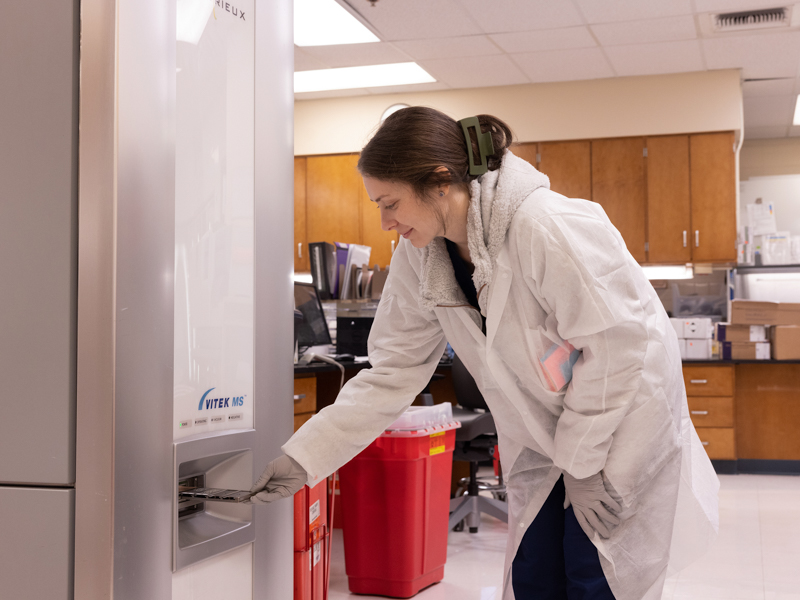C. auris fungal infection: what you need to know

How do you help protect yourself from a highly contagious, antibiotic-resistant fungal infection with a high mortality rate?
Be vigilant about the possibility of exposure, and educate yourself about candida auris, also called C. auris, a University of Mississippi Medical Center expert says.
The first cases of locally acquired C. auris have occurred in Mississippi, prompting state health experts to investigate its source and to issue a warning to the health care community.
In its most recent Mississippi Health Alert Network update on Jan. 11, the Mississippi State Department of Health confirmed a total six cases of invasive infection with two deaths, and an additional 37 colonized individuals, since November 2022.
“Colonization” refers to the presence of microorganisms that can cause infection, but not to the infection itself. A person can be colonized with C. auris, and have no symptoms of infection – but even so, are contagious.
The ongoing outbreak and transmission of cases in central Mississippi “is a rapidly expanding and serious situation. Additional cases of invasive infection and colonization may be identified,” MSDH said in its Jan. 11 advisory to health care providers.

“The public needs to be aware that we are seeing this fungus. This is the first time we’ve had a locally acquired case in Mississippi,” said Dr. Bhagyashri Navalkele, an associate professor in the University of Mississippi Medical Center Division of Infectious Diseases.
MSDH reported that most cases are emanating from a central Mississippi long-term acute care facility. MSDH did not name the facility, but said it accounts for four cases of invasive infection and 28 of the colonization cases.
Potentially linked to that, MSDH said, are an additional five cases of colonization detected at a second, unnamed long-term acute care facility in central Mississippi, “with evidence of transmission.”
“Other unnamed health care facilities in the state” also are reporting cases of invasive infection and colonization in addition to the two in central Mississippi, MSDH said.
As of Jan. 10, UMMC had treated seven patients with forms of C. auris or C. auris exposure, Navalkele said. Of the seven, two were infected, two were colonized and three high-risk patients had been exposed. One of the infected patients died and one has been discharged. One of the colonized patients has been discharged, and two of the high-risk patients who were exposed have been discharged.
The C. auris infection primarily affects people already being treated for multiple serious or chronic health conditions, often spreading in a hospital or long-term care facility. It’s resistant to multiple antifungal drugs, and some strains are resistant to all three available classes of antifungals, the Centers for Disease Control and Prevention says.
C. auris is easily transmissible, both on surfaces and person-to-person, and especially in congregate settings such as long-term care facilities. It can even be carried on someone’s skin without causing that person to be infected or have symptoms, but still allowing the spread to others, the CDC says.
C. auris, which first began spreading in the United States in 2015, is an emerging global health threat, the CDC says. “It can cause severe infection and death in about 60 percent of patients,” said Navalkele, UMMC’s medical director of infection prevention.

The fungus can enter the bloodstream and spread throughout the body, causing serious invasive infections. Symptoms of the fungus are flu-like and include fever and chills. Those symptoms are common to other infections, sometimes making C. auris difficult to confirm without testing.
“Colonization means you could be a silent carrier of the fungus, and it can be an active infection later on,” Navalkele said. “If you are identified as colonized, you need to make sure that your health care team knows about this so that they can immediately start isolation precautions and initiate appropriate treatment when infection is suspected.”
“Because C. auris can colonize patients for many months, persist in the environment, and withstand some commonly used health care facility disinfectants, it can spread easily and cause outbreaks in health care facilities,” MSDH says in the advisory.
Prevention and diagnosis are imperative because the fungus can be so difficult to treat, Navalkele said. “If you’ve had a recent stay at a health care facility, nursing home or long-term care facility, have lines and tubes in place, have underlying health conditions and have now developed an infection, you should immediately see a provider and get worked up to make sure it’s not this fungus,” she said.
If a family member has C. auris, she said, take preventive measures around them, such as bleach-cleaning surfaces in the home. “Wash hands before and after caring for them and touching any medical devices,” she said. “When visiting a family member in a health care setting, be 100 percent compliant in wearing personal protective equipment – gowns and gloves – so that you don’t take the fungus or other antibiotic-resistant infections back home and across the community.”
The fungus “likes to stick to surfaces and can stay there for months if it’s not cleaned,” Navalkele said. “At UMMC, we are doing everything possible to make sure that no harm occurs.”
That also includes frequent hand-washing by front-line staff, including before entering and after exiting a patient’s room; isolation of infected and colonized patients; sanitizing rooms, equipment and surfaces; and use of full protective garb when in the presence of a patient, she said.
Family members who are healthy probably have a low chance of C. auris infection, the CDC says. There is no recommendation for family members who have had frequent contact with the infected patient to get tested, Navalkele said. “Even if you test negative, it’s possible that you are exposed and colonized.”
“If you think you have the infection, follow the same steps as when you get sick. If you have chills, fever or signs of infection, call your provider,” she said. “And if you’ve been exposed to someone who is known to carry the fungus, let the provider know so that they can make a proper treatment plan.”
Learn more about C. auris and fungal infections here.


